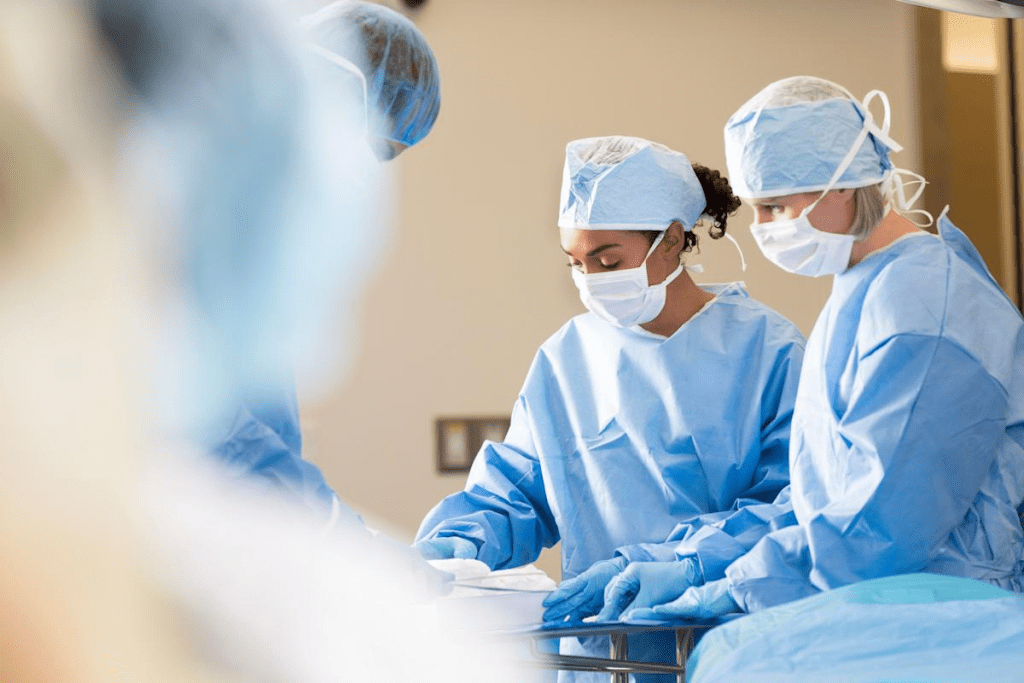Last Updated on October 31, 2025 by

Recovering from urethral stricture surgery can take different amounts of time. It depends on the surgery type and your health. The time needed to get better after urethral stricture surgery varies.
For example, minimally invasive procedures like internal urethrotomy can help you recover faster. You might feel better in just a week. But, more complex surgeries like urethroplasty might take longer. You could need 4 to 6 weeks to fully recover.
At Liv Hospital, we aim to give you top-notch care. We support you every step of the way during your recovery.
The type of surgery for urethral stricture greatly affects recovery. Urethral stricture treatment includes various surgeries, each with its own recovery time.

Every patient is different, and the surgery type greatly impacts recovery time. Two main surgeries are used: internal urethrotomy and open urethroplasty.
Internal urethrotomy is a quick procedure where a surgeon uses a scope to cut through scar tissue. It’s done as an outpatient, allowing for fast recovery. Most patients can go back to normal activities in just a week.
Urethroplasty is a more involved surgery that removes or rebuilds the narrowed urethra. It’s used for complex strictures and takes longer to recover, usually 3-4 weeks. This surgery is more extensive, so patients need more time to heal.
Procedure type is a big factor in recovery time, but other things matter too. Health, stricture severity, and complications can influence recovery. Our team at Liv Hospital focuses on personalized care to help patients recover well. We understand these factors to manage expectations and provide the right care.
After urethral stricture surgery, knowing what to expect in the hospital can help your recovery. At Liv Hospital, we focus on your comfort and care. We make sure you get all the support you need during your stay.
The time you spend in the hospital depends on your surgery. For urethroplasty or other surgeries, stays usually last 3“4 days. But it can be shorter or longer, based on your needs and the surgery details.
We take pain management very seriously during your hospital stay. We use the latest methods to keep you comfortable. Our plan includes:
We aim to make your hospital stay as comfortable as possible. This helps you recover well.
The time a patient needs a catheter varies with the urethral procedure. For urethroplasty, a surgery to fix the urethra, the catheter stays in for 2 to 3 weeks. This helps the area heal properly.

Each surgical method for urethral stricture has its own catheter time. For example, after an internal urethrotomy, the time might be shorter than for urethroplasty. Knowing these times helps patients get ready for their recovery.
It’s important to care for the catheter to avoid infections and ensure a smooth recovery. We give our patients clear instructions on how to keep the catheter secure, stay clean, and watch for signs of trouble. Catheter care is a key part of post-operative management and affects healing.
Having a catheter can sometimes be uncomfortable or lead to problems if not handled properly. Our healthcare team is here to support patients through their recovery. We help with managing pain and preventing issues like urinary tract infections. By following our advice, patients can reduce the risk of problems and focus on getting better.
At Liv Hospital, we’re dedicated to giving our patients the best care, including those with urethral reconstruction. Our team is ready to answer any questions or concerns patients have about their catheter or treatment.
The road to recovery after urethroplasty is complex. But knowing what to expect can help a lot. At Liv Hospital, we support our patients through every stage of their healing. We make sure they get the care and support they need.
The catheter is usually removed between 2 to 3 weeks after surgery. This is a big step in getting better. Then, we watch how patients urinate and look for any problems.
Key aspects during this period include:
In months 1-3, patients usually see their healing get better. It’s important to keep up with our healthcare team. This way, we can track how well you’re healing and fix any issues quickly.
Progressive healing involves:
Full healing might take several months. We offer ongoing support and advice to help you recover well. Our team is dedicated to guiding you from the start of your recovery to when you’re fully healed.
Going back to normal after urethroplasty takes time and understanding. At Liv Hospital, we help patients slowly get back to their daily lives. We make sure they recover safely and effectively.
Most people can start with light activities a few weeks after surgery. But they should avoid heavy lifting, bending, and hard work for 4-6 weeks. It’s important to talk to your doctor about your job to know when to go back.
Starting to exercise again is key, but do it carefully. Avoid hard exercises, like heavy lifting or bending, for 4-6 weeks after urethral stricture surgery.
Sexual activity usually starts again 6-8 weeks after urethroplasty, based on the doctor’s advice. Always follow your healthcare team’s specific instructions to avoid problems.
“The key to a successful recovery is patience and adherence to the post-operative instructions provided by your healthcare team.” “ A urologist
At Liv Hospital, we’re dedicated to your care and support during recovery. Knowing the rules for getting back to normal helps you safely return to your life after urethral reconstruction.
When it comes to urethroplasty, success rates and recurrence risks are important. Patients want to know if the surgery will work long-term. They also worry about the chance of the problem coming back.
The success of urethroplasty surgery depends on the method used and the stricture type. For example, buccal mucosa graft urethroplasty has a success rate of up to 96.4% in some studies. This method uses mouth tissue to fix the urethra, which works well for many.
Other urethroplasty methods also have good success rates. But the results can vary based on the stricture’s length, location, and the patient’s health.
Even with high success rates, there’s a chance of stricture coming back after urethral stricture surgery. The recurrence rate can be between 20% to 50% in one to two years. It’s key for patients to know this to set realistic expectations and follow care instructions well.
The time when recurrence might happen can vary. Some cases can happen in the first year, while others might occur later. Regular check-ups are vital to catch any recurrence early.
At Liv Hospital, we stress the need for regular follow-ups. This helps us see how urethroplasty is working long-term and catch any problems early. Our patients get close monitoring to spot any recurrence signs quickly.
A good follow-up plan not only helps manage recurrence. It also gives patients peace of mind, knowing they’re getting ongoing care and support.
Urethral stricture surgery, like urethroplasty, is very effective. It greatly improves how people urinate. We’ve looked at different surgeries and how long it takes to recover.
It’s important to keep up with follow-ups because strictures can come back. At Liv Hospital, we offer full care and support. This helps our patients get the best results from urethroplasty.
Urethroplasty is a detailed surgery that needs careful aftercare. This helps avoid any problems. If you’re thinking about this surgery, talk to our experts. They can help you understand what to expect and make the right choice for you.
Recovery time depends on the surgery type and your health. Quick procedures like internal urethrotomy can take a week. More complex surgeries, like urethroplasty, may take 4 to 6 weeks.
You’ll usually stay in the hospital for 3-4 days after urethroplasty. Our team will manage your pain and watch for any issues.
You’ll likely have a catheter for up to 3 weeks after urethroplasty. Keeping it clean is key to avoiding infections and aiding in recovery.
The catheter is removed between weeks 2-3, a big step in healing. In months 1-3, you’ll see your health improve slowly, with better urine flow.
You can start with light activities a few weeks after surgery. Avoid heavy lifting and strenuous exercises for 4-6 weeks. Sex is usually okay after 6-8 weeks, with your doctor’s okay.
Urethroplasty, like buccal mucosa grafting, has high success rates, up to 96.4%. But some may need more surgery. Success depends on the surgery, stricture length, and your health.
Regular check-ups are vital to catch any problems early. At Liv Hospital, we stress the importance of follow-up care to ensure your success.
Urethroplasty is a surgery to fix or rebuild the urethra, often for strictures. It involves removing the bad part and reconnecting the good parts or using a graft.
Minor strictures might be treated with simple procedures. But, serious damage usually needs surgery like urethroplasty, for proper healing and to prevent more problems.
Subscribe to our e-newsletter to stay informed about the latest innovations in the world of health and exclusive offers!